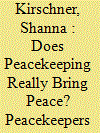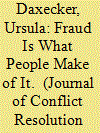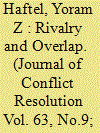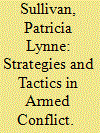|
|
|
Sort Order |
|
|
|
Items / Page
|
|
|
|
|
|
|
| Srl | Item |
| 1 |
ID:
169071


|
|
|
|
|
| Summary/Abstract |
Peacekeeping mitigates killing, but nonlethal violence also influences both positive peace and stability. We evaluate peacekeepers’ effect on one such type of abuse, sexual violence. We posit that peacekeepers raise the cost of abuses and foster institutional and cultural changes that curb violence. We find that missions both reduce the chance of any violence and limit its prevalence; larger deployments and multidimensional missions are more effective. Governments curtail violence more quickly than rebels do in response to military contingents; rebels are especially responsive when missions include large civilian components. These findings contribute to our understanding of peacekeeping in three primary ways: we expand the evaluation of peacekeeping to consider nonlethal violence; we draw attention to mission size, capacity to use force, and civilian-led programming as determinants of effectiveness; and we demonstrate how addressing nonlethal violence requires similar tools as lethal violence but is further enhanced by specific civilian-led initiatives.
|
|
|
|
|
|
|
|
|
|
|
|
|
|
|
|
| 2 |
ID:
169073


|
|
|
|
|
| Summary/Abstract |
Why do fraudulent elections encourage protesting? Scholars suggest that information about fraud shapes individuals’ beliefs and propensity to protest. Yet these accounts neglect the complexity of opinion formation and have not been tested at the individual level. We distinguish between the mobilizing effects of actual incidents of election fraud and individuals’ subjective perceptions of fraud. While rational updating models would imply that both measures similarly affect mobilization, we argue that subjective fraud perceptions are more consistent predictors of protesting, also being shaped by attitudes, information, and community networks. Our empirical analysis uses geo-referenced individual-level data on fraud events, fraud perception, and protesting from the 2007 Nigerian elections. Our analysis yields two main findings: proximity to reported fraud has no effect on protesting and citizens perceiving elections as fraudulent are consistently more likely to protest, and more so if embedded in community networks.
|
|
|
|
|
|
|
|
|
|
|
|
|
|
|
|
| 3 |
ID:
169072


|
|
|
|
|
| Summary/Abstract |
When rebels make alliances, what informs their choice of allies? Civil wars are rarely simple contests between rebels and incumbent regimes. Rather, rival militant networks provide the context in which these fragmented conflicts unfold. Alliances that emerge within this competitive landscape have the power to alter conflict trajectories and shape their outcomes. Yet patterns of interrebel cooperation are understudied. The existing scholarship on rebel alliances focuses on why rebels cooperate, but little attention is given to the composition of those alliances: with whom rebels cooperate. We explore how power, ideology, and state sponsorship can shape alliance choices in multiparty civil wars. Employing network analysis and an original data set of tactical cooperation among Syrian rebels, we find compelling evidence that ideological homophily is a primary driver of rebel collaboration. Our findings contribute to an emerging literature that reasserts the role of ideology in conflict processes.
|
|
|
|
|
|
|
|
|
|
|
|
|
|
|
|
| 4 |
ID:
169074


|
|
|
|
|
| Summary/Abstract |
This article analyzes the role of individual redistributive preferences on protest participation. The article focuses on Latin America, a region that has experienced substantial protests and demonstrations in the last decade, making use of individual-level data on redistributive preferences and protest participation collected across eighteen countries in 2010, 2012, and 2014. The results show evidence for an association between strong individual preferences for redistribution and participation in protests motivated by the low quality of services and institutions, failures to reduce corruption, and perceived lower standards of living. The results are robust to alternative estimators, samples, and model specifications and not affected by endogeneity concerns.
|
|
|
|
|
|
|
|
|
|
|
|
|
|
|
|
| 5 |
ID:
169076


|
|
|
|
|
| Summary/Abstract |
The proliferation and scope expansion of regional organizations (ROs) is one of the most prominent features in contemporary international politics. In particular, many regional economic organizations (REOs) have expanded into the security realm. This trend has often resulted in an overlap with regional security organizations (RSOs) already in place. This study sheds light on this phenomenon by identifying the conditions under which REOs trespass into the security policy domain despite the fact that preexisting RSOs already fulfill security functions. We argue that the presence of strategic rivalries is an important driver of the creation and depth of organizational overlap through scope expansion. Specifically, RSOs that include significant interstate rivalries propel a subgroup of like-minded states to advance and deepen security cooperation through their existing REOs. Using an original data set of security cooperation within economic and security ROs and a quantitative analysis, we find substantial support for this argument.
|
|
|
|
|
|
|
|
|
|
|
|
|
|
|
|
| 6 |
ID:
169070


|
|
|
|
|
| Summary/Abstract |
Sexual violence is believed to be widespread during war. Yet empirical evidence concerning its prevalence is often limited. Victims, out of feelings of shame or fear, underreport this form of violence. We tackle this problem by administering a list experiment in a representative survey in Sri Lanka, which is only recently recovering from an ethnic civil war between Sinhalese and Tamils. This unobtrusive method reveals that around 13 percent of the Sri Lankan population has personally experienced sexual assault during the war—a prevalence ten times higher than elicited by direct questioning. We also identify vulnerable groups: Tamils who have collaborated with rebel groups and the male-displaced population suspected of collaboration with the Liberation Tigers of Tamil Eelam. Our experimental evidence thus lends support to reports on the asymmetric use of sexual violence by government forces, qualifies conventional wisdom on sexual violence during war, and has important implications for policy.
|
|
|
|
|
|
|
|
|
|
|
|
|
|
|
|
| 7 |
ID:
169077


|
|
|
|
|
| Summary/Abstract |
We introduce a new data set on the strategies and tactics employed by belligerents in 197 internal armed conflicts that occurred between 1945 and 2013. The Strategies and Tactics in Armed Conflict (STAC) data set provides scholars with a rich new source of information to facilitate investigations of how regimes and their foreign supporters have responded to insurgent threats and the effects of actors’ force employment choices on a wide variety of intra- and postconflict outcomes. In addition to seventeen novel variables that measure the strategies and tactics employed by governments and intervening states, the STAC data set contains independently coded measures of many variables that overlap with existing data sets—a feature that facilitates the replication of existing studies and robustness checks on the results of new studies. We demonstrate the utility of the STAC data with an analysis of the impact of rebel mobilization on the basis of ethnicity on the propensity of governments to employ forced resettlement, civilian protection, civilian welfare projects, and civilian targeting to counter the insurgent threat.
|
|
|
|
|
|
|
|
|
|
|
|
|
|
|
|
| 8 |
ID:
169075


|
|
|
|
|
| Summary/Abstract |
Militant groups are usually committed to violent tactics to pursue their goals. Yet, in certain cases, militants adopt nonviolent tactics and desist from violence. As internal conflict rarely remains isolated from outside influence, I argue that external supporters affect militant groups’ tactical considerations. I expect that different external benefactors will have different effects on the probability of switching to nonviolent tactics. The focus here is on diaspora and foreign states as external supporters, and I conduct a large-N analysis with violent group-level data. I find that external support from diaspora is positively associated with rebels’ adoption of nonviolent tactics, while support from foreign states is not. In fact, foreign states as supporters are not as effective influencers as diaspora. These findings shed light on the important role of nonstate actors in conflict dynamics and present evidence that challenges the notion that diaspora’s involvement prolongs internal conflicts
|
|
|
|
|
|
|
|
|
|
|
|
|
|
|
|
|
|
|
|
|